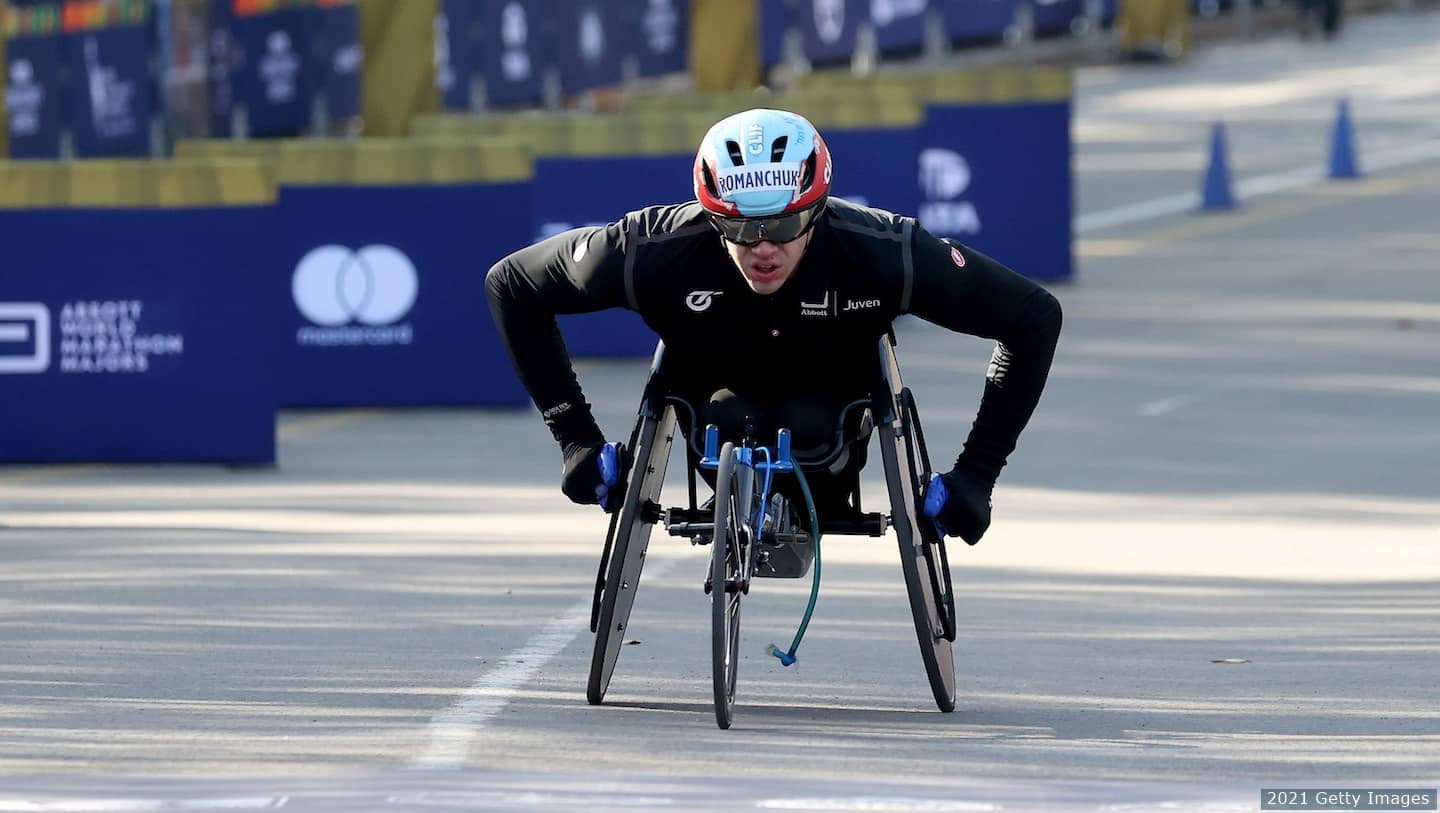
With Spare Chairs And Time, Paralympians Give Back
by Ryan Wilson

Daniel Romanchuk competes at the 2021 New York City Marathon. (Photo: Getty Images)
As wheelchair racers compete over the years, their equipment can quickly pile up.
Some athletes will place their spare tires and chairs in storage, only to collect dust. Other racers will give back and give away what they aren’t using.
Take Daniel Romanchuk, for example.
Romanchuk, a two-time Paralympic medalist, has donated several chairs to the Bennett Blazers, an adaptive sports program in Baltimore. The Blazers are a part of the Kennedy Krieger’s Physically Challenged Sports Program, and it offers opportunities for kids all the way up to the age of 18 to work fine motor skills and try Para sports.
Romanchuk is an alum of the program, and he has donated anything from a regular chair to a $6,000 racing chair to athletes following in his tracks.
“If I’ve basically got a piece of equipment that I’m not using anymore, I’ll just see if they can put it to use,” Romanchuk said. “I know it’s going to get a good life out there, and get a lot of use.”
Gerry Hernan is a coach for the Blazers. He says there are 65 to 70 athletes involved in their programs, and they have nearly as many spare basketball and racing chairs. They rely primarily on donations and grants for equipment. The Challenged Athletes Foundation has provided additional funding, as well.
Hernan said the chairs donated from athletes like Romanchuk work well for the kids, and they may come equipped with wheelie bars to prevent falls.
“For really young kids, it’s a good start chair,” Hernan said. “(The chairs were) originally made for someone who is 30 inches tall and 30 pounds. For our younger kids, that’s a nice fit.”
Romanchuk said it is important for athletes to help kids with disabilities get involved in sport, whether they want to reach an elite level or not.
He first got involved with the Bennett Blazers when he was 2 years old, working his motor and development skills. He was swimming one year into the program, racing the next and then trying hockey and archery.
Romanchuk said he remembers athletes with families and Paralympic experience coming back to speak at the program.
“I think it just kind of showed us the possibilities that were out there,” he said. “I want to continue that, and help the next generation.”
Romanchuk will come back a couple times a year. He hosts clinics about racing and other topics. During the pandemic, he held a virtual clinic to keep kids active. Outside of that, he is just a quick call away to help fix any equipment.
Gwena Herman, the co-founder of Bennett Blazers, was recently on the track, trying to fix a chair. She was having trouble, so she called Romanchuk.
“The parents and the athletes were flabbergasted,” Gwena Hernan said. “‘You’re going to call Daniel Romanchuk? How could you do that?’ ‘Well,’” she replied, “‘I’ve known him his whole life.’”
Tatyana McFadden is another Blazer who developed into a Paralympic racer. The eight-time Paralympic gold medalist has donated basketball and racing chairs and sleds in the past. She recently donated a “truckload” of parts, like tires for chairs.
“Our alumni athletes are really tremendously supportive of the program,” Gerry Hernan said. “It makes a big difference.”
Outside of McFadden and Romanchuk, the Blazers have acquired equipment from Paralympians Ryan Neiswender, Joshua George and Gail Gaeng. Neiswender was a member of the gold medal-winning men’s wheelchair basketball team at the Paralympic Games Tokyo 2020, and Gaeng was on the Rio 2016 women’s basketball team that also won gold. George has competed in five Games and won five medals.
Neiswender works for Visa, and he helped the Blazers win a $20,000 grant for more chairs.
“They are tremendous role models,” Gerry Hernan said of the generous Paralympians.
When athletes give back, Hernan said the kids benefit in multiple ways, and it encourages them to go for their dreams.
“We’ve always had the philosophy that they should just do the best they can, and it doesn’t really matter what anybody else is doing around them,” he said.
Hundreds of kids have gone through the Bennett Blazers programs over the years, and Hernan said McFadden, Romanchuk, George, Neiswender and Gaeng are making a lasting impact for generations to come.